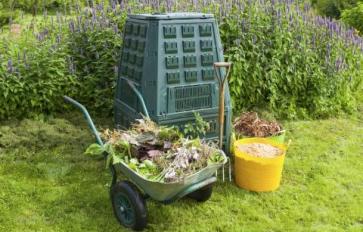
The apples are dropping, the squash is ripening, and its tomato harvest time! If you are one who enjoys putting up your fresh food for winter, your kitchen may be a busy place this time of year. Between harvesting, canning, pickling, and freezing, it’s inevitable that a drip of this or that or an overripe fruit will attract and breed fruit flies. Are you brewing cider or beer? Perhaps you can relate. (And, even if it is not harvest season, fruit flies will enjoy an overripe banana nearly any time of the year.) Arm yourself with these natural methods to get rid of pesky fruit flies in the kitchen, especially during harvest time.
Fast Facts About Fruit Flies
- Female fruit flies can lay up to 500 eggs at one time!
- Fruit flies will live for approximately one week.
- Fruit flies do not like cold temperatures; they prefer the 75-80F range.
- Fruit flies can enter the home through poorly sealed doors and screens.
How To Get Rid Of Fruit Flies
Before doing anything, though, first try to isolate the source attracting fruit flies. Fruit flies are especially attracted to the ethanol that develops as glucose and fructose in the cell walls of fruit degrades, and other raw foods containing sucrose can also develop this byproduct, which is alluring to fruit flies.
Fruit flies love the following things, and will continue to breed here:
- Ripening (or overripe) fruit (compost this!)
- Dirty dishes, especially with food scraps (keep up on dishes!)
- Damp kitchen rags (wash these daily!)
- Within a kitchen drain in which rotting food products are lingering (clean with white vinegar!)
- Trash cans or recycling bins with food waste (keep these clean daily!)
- In pantry-stable food items like potatoes and onions (keep these in the fridge or remove damaged spots and use immediately!)
- In decomposing compost (freeze it or keep it well covered and remove it daily!)
How To Trap Fruit Flies
Once removing any source of fruit fly breeding grounds, implement a trapping method of your choice. Consistency is key! Be sure to implement eradication methods as well as any of the prevention methods regularly to avoid supporting a fruit fly breeding ground in your kitchen.
How To Make Fruit Fly Traps: Vinegar/Banana/Wine [with soap] Trap
Use your choice of bait! Fruit flies will be attracted to any of the items listed above. Be sure to use a vinegar that is NOT white vinegar; select a cider, red wine, or balsamic vinegar that is made with the fermentation of fruit. A mushy banana or other piece of fruit works great, and stale wine of any kind will also attract fruit flies. Find some images of various traps here.
- Place 1/4 cup of the bait in a cup or glass that is taller than it is wide.
- If you would like to add soap (basically, a poison for the fruit flies that also serves to break the surface tension on the liquid of choice) to the bait, put a few drops into the bait and mix together.
- Use a funnel, a rolled-up piece of paper, or plastic wrap pulled tight with holes poked in it as a way to entrap the flies. Ensure that the seal of any of these items is secure. If using the plastic wrap method, a rubber band can support this seal; if using the funnel method, insert the small end of the funnel into the mouth of the cup or glass so that the wide end is open to flies in the room.
- Place the trap or traps in areas proximate to the infestation.
- Change trap at least every other day to maintain a sanitary kitchen.
If you’re not feeling so crafty, leave out a bottle of nearly empty wine or beer. The fermented beverages will attract fruit flies, and the neck of the bottle will serve as a “trap” to make it difficult for them to escape feasting on the liquid. To add some security that the flies will die, add a few drops of dish soap to the wine/beer bottle.
How To Prevent Fruit Flies
- Eliminate any of the breeding grounds listed above: remove trash and compost; clean kitchen rags daily; store produce in the fridge; keep up on dishes; clean the sink, drain and countertops; etc.
- Place strongly scented herbs, like a basil plant, in the kitchen. Fruit flies do not like strong smells.
- Soak a kitchen cloth or sponge in a few drops of lavender, lemongrass, or other pungent antibacterial essential oil (another strong smell).
- Burn incense in the kitchen area (again, a strong smell).
- Wash produce as soon as it enters the home. Sometimes fruit fly nests can travel on fruit from the grocery store, or fruit flies can breed on garden produce. Washing fruit and vegetables and storing them in the fridge can keep fruit flies at bay.








